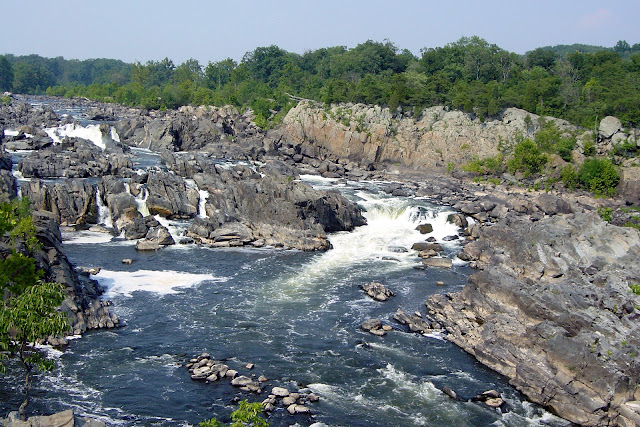 |
| The Great Falls of the Potomac in Montgomery County, Maryland |
Earlier today Montgomery County, Maryland (pop. 971,000) passed the State’s first ban of coal tar pavement sealers. Montgomery County is the 8th most affluent county in the US and the most educated. It is the third largest ban to be passed in the US and the largest yet in 2012. The bill’s primary sponsor, Councilmember Craig Rice said of the issue, “This is bad stuff we don’t need to use if we don’t have to.” He added at an earlier meeting, “Why would we put our constituents in a position [of exposure] where we know there are carcinogens?”
Other councilmembers pointed out that since Home Depot and Lowes won’t stand behind this problematic product, then maybe the County shouldn’t either. Councilmember Nancy Navarro stated that banning coal tar pavement sealants is important for our environment and the human health of citizens. They also said a ban makes perfect sense from a cost-benefit perspective. They were referring to the discovery that pond sediments were contaminated with high-levels of polycyclic aromatic hydrocarbons (PAHs). The levels were high enough that the sediment could no longer be re-used as “clean fill.” Because this is the first instance of its kind in Maryland, the State was uncertain what proper disposal will look like, but it is certain that it will become much more expensive. Why hasn’t this been seen before? Most likely no one has bothered to look.
 |
| Councilmember Craig Rice called today’s ban a “common sense measure.” |
In a subcommittee in July, sealant industry representatives tried to portray the USGS research as the false, primary source for all subsequent coal tar sealant studies. When it was pointed out that the EPA had also done their own research, it was claimed that all it demonstrated was that both asphalt-based and coal tar based sealers have PAHs. They failed to mention that the runoff from the coal tar sealed lot was 100 times more potent than an asphalt based sealer even though the pavement was not subject to any vehicular traffic.
The industry acknowledged that the sealant wears down and washes away. They contended that it doesn’t travel far and that the particles do “not have much bioavailability.” The industry has yet to produce anything that shows the bioavailability of their cured product.
The ban passed unanimously 9-0. Technically the County Executive could veto this bill, but an override only requires 6 votes.
The effective date of the ban is a little uncertain, but appears to be 91 days from the date of passage. If true, it essentially will go into effect next sealant season. The penalties in the bill are:
Any violation of this Chapter is a Class A violation. However, notwithstanding Section 1-19, the maximum penalty for a civil violation of Article I is $1,000 for an initial or repeat offense. Each day a violation continues is a separate offense.
Congratulations to the Montgomery County Council, staff and its citizens for its thoroughness in exploring the pros and cons of this legislation and having the courage to do what is right for its people!
